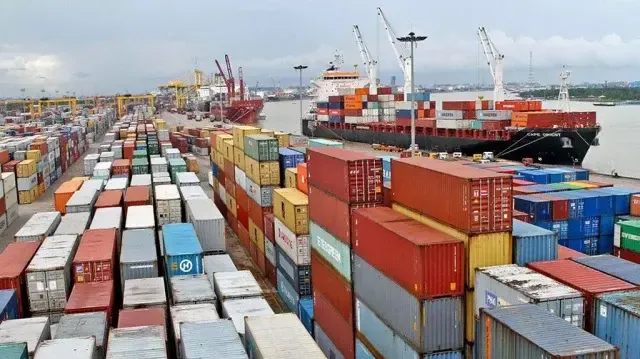India Ends Transshipment Privilege for Bangladesh's Export Cargo

Synopsis
Key Takeaways
- India has terminated transshipment privileges for Bangladesh.
- Previous circular allowed transit through Indian territory.
- Indian exporters raised concerns over competition.
- US tariffs could affect Bangladesh’s economy.
- Tensions between India and Bangladesh have heightened.
New Delhi, April 9 (NationPress) India has officially terminated the transshipment privilege granted to Bangladesh for the purpose of transporting its export cargoes to other nations via Indian territory.
A notification released by the Central Board of Indirect Taxes and Customs (CBIC) on April 8 indicates the immediate cancellation of the earlier circular issued on June 29, 2020, which facilitated such transshipments. Nonetheless, cargo that has already entered India may still be permitted to exit the country, following the guidelines outlined in the previous circular.
The 2020 circular had allowed the transshipment of export goods from Bangladesh to third countries through Indian Land Customs Stations en route to Indian ports and airports, thereby supporting smooth trade flows for Bangladesh’s exports to nations like Bhutan, Nepal, and Myanmar.
Indian apparel exporters had previously called on the government to revoke this privilege, citing Bangladesh as a significant competitor in the textile industry due to its lower labor costs. There were also claims that Bangladesh was misusing this facility to undermine Indian exports.
Federation of Indian Export Organisations (FIEO) Director General Ajay Sahai mentioned that Indian exporters had voiced concerns over diminished space for their shipments at airports because of the transshipment allowance for Bangladeshi cargoes.
This announcement occurs at a time when the US has increased tariffs on many countries, with expected repercussions for Bangladesh’s economy.
The decision also follows controversial remarks made by Professor Muhammad Yunus, Chief Adviser of Bangladesh’s interim government, regarding India's Northeast during his recent visit to China. Yunus suggested that with Northeast India being “landlocked”, Dhaka was the “only guardian of the ocean for this region.
India reacted strongly to these comments, which were interpreted as an attempt by Bangladesh to assert control over access to Northeast India. Yunus has shifted Bangladesh’s foreign policy closer to China, a nation he considers a new strategic ally. This has further strained relations between New Delhi and Dhaka.
The issue of minority persecution in Bangladesh continues to be a significant concern in the bilateral relationship, and Dhaka’s position on this matter has not been reassuring for India.







